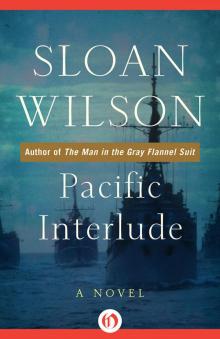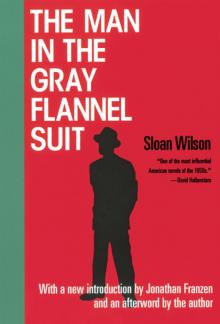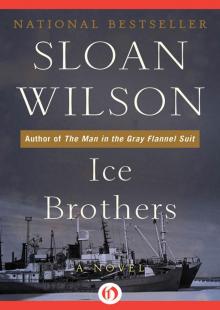- Home
- Sloan Wilson
Ice Brothers Page 9
Ice Brothers Read online
Page 9
“Oh my!” Farmer said, sitting up and rubbing his eyes.
“The bastard, the bastard, the bastard!” Paul said, putting on his trousers.
Green said nothing, but his lips moved a lot.
On deck Paul found complete confusion while half-dressed men dragged a heavy collision mat from the hold. The weather had turned cold again, and a light rain was falling. Wearing a parka, Mowrey stood on the wing of the bridge with a glass in his hand. He was smiling happily. On the wing of the Nanmak’s bridge the young lieutenant with the broad freckled face was also watching, and also smiling. A young machinist’s mate who had got his hand caught in a watertight door came on deck holding it against his chest and whimpering. Green took him below.
“If this were a real collision, I figure we’d be about a hundred fathoms down by now,” Mowrey said. “Speed it up, girls! This is the big game!”
A week went by with more drills at every hour of the day and night. When the 20-millimeter guns arrived, Mowrey expressed amazement that Paul did not know how to assemble them and ordered him to learn immediately. While Paul was working with guns, and some men from the yard on the complex mechanisms, he noticed that Mowrey was standing on a wing of the bridge blinking a signal light on him.
“Did you want something, sir?” he asked, wiping some grease from his face.
Mowrey said nothing but the light continued to blink. Getting the idea at last, Paul said, “I’m sorry, sir, but I can’t read blinker lights yet.”
“I can see that,” Mowrey said pleasantly. “If you could read what I just called you, you’d be after me with a monkey wrench. I want you and Greenberg to practice blinker lights at least an hour a day.”
“Aye, aye, sir,” Paul said, and bent over the jigsaw puzzle of the guns again.
It wasn’t the work, the exhaustion, nor even the fact that he was not allowed to go ashore long enough to telephone his wife that bothered Paul. It was not even the necessity of working harder than he ever had known he could without the slightest hope of praise or relief from criticism that tormented him. The worst part of the ordeal was the growing conviction that he could never please Mowrey, that he could never change himself from a college boy to a skilled Coast Guard officer in a few weeks, months or even years. One thing he learned quickly was that there was nothing of the fake about Mowrey. His contempt for his officers and men was not feigned for a purpose and his promise to arrange horrible assignments for those who failed to shape up was probably no idle threat. Paul became obsessed with the fear of being assigned to some tiny weather station or supply depot deep within the Arctic Circle, where he might be left for however many years the war lasted.
Sometimes when he was too tired to sleep, Paul lay in his bunk planning how he might explain to Mowrey that it really was not his fault that he had been a college boy, not an old Greenland hand, when the war started, and that he was really working as hard as any man could to make up for his lamentable deficiencies. This sounded reasonable, but he realized with shock that Mowrey was not susceptible to this kind of logic. The truth was, he suspected, that Mowrey hated him for reasons which had little to do with his inefficiencies. The classic, justified anger which a mustang who had taken twenty years to earn a commission felt for a reserve officer who had won his almost overnight was undoubtedly a large part of it. If Mowrey, as he said, had started his career as a fisherman’s cabin boy, he might have developed a healthy or unhealthy hatred for anyone, especially a college boy, who appeared to be rich, “upper-class,” and soft while mysteriously being given most of life’s luxuries without effort. If Mowrey felt this way, he might really enjoy torturing his “Yale” for a few months before finally crushing him with the worst, most humiliating assignment he could devise.
Perhaps I’m going paranoiac, Paul thought, but there was at least a horrifying possibility that this dark diagnosis of his situation was right.
Paul’s confusion was increased by the fact that he continued to admire Mowrey as much as he hated him. There was no doubt whatsoever that the man was fast turning the Arluk from a shambles into an efficient Coast Guard cutter. Mowrey was much easier on the enlisted men than on his officers and most of them clearly respected, almost loved him. They worked hard and cheerfully for him, and as a reward, many of them were already being allowed regular liberty ashore.
Perhaps he was just being ridiculously oversensitive, Paul told himself. Farmer, after all, endured his share of insults without apparent resentment, and though Green looked tormented, he grimly tried to do his duty without a word of complaint. In a way Paul almost envied Green, because he could rightfully blame Mowrey’s crazy anti-Semitism rather than his own weaknesses for most of the abuse he got. If Green were transferred with a bad fitness report, anyone who thought about it would know that almost no Jew could get along with Mad Mowrey, and Green would not have to spend the rest of his life questioning himself.
The hell with it, Paul always concluded. As Sherman said, war is hell, but I didn’t understand that this is true even when we’re thousands of miles away from any foreign enemy.
About ten days after Mowrey came aboard he made such a complete ass of himself that for once Paul did not have to wonder who was right and who was wrong. Immediately after dinner that memorable night, Mowrey got all dressed up in his best blue uniform and went ashore, presumably for the night, as he usually did, but on this occasion he returned shortly before midnight. To the astonishment of the quartermaster on duty, he had a woman with him, a buxom blonde in a bright green coat. “Tell Yale I want to see him,” he said and went to his cabin with his friend.
“Captain wants you,” the quartermaster said, shaking Paul awake, and slyly added, “You’re going to get a little surprise.”
Paul was indeed astonished to see Mowrey pouring a scotch for a blonde who was sitting on his bunk in the sacrosanct commanding officer’s cabin.
“You wanted me, sir?” he said, trying to keep his face expressionless.
“Yale, I want you to meet Helen here. Helen, this is my Yale, a good boy if I can whip him into shape.”
Helen giggled and said, “Pleased.”
“Pleased,” Paul said.
“Yale, I want you to rouse up Cookie. Tell him we want scrambled eggs, sausages and coffee.”
“Aye, aye, sir.”
“Then I want you to go to the bar across the street. Bring me four bottles of cold beer and a pack of cigarettes. What kind do you want, dearie?”
“Luckies.”
“She wants Luckies.” Taking out his wallet, Mowrey gave him a five-dollar bill.
“Is that all, sir?”
“Hurry it up. I want the beer.”
“Aye, aye, sir.”
Cookie cursed in German when Paul awoke him, but suddenly cheered up when he learned that he was to get food for the captain.
“Right away, right away,” be said, and began to get dressed.
Paul hurried to the bar, suddenly jubilant at the thought that he would at least get a chance to telephone his wife.
“Paul!” she said sleepily after the telephone had rung several times, “Where are you? Where have you been?’
“I’m still in Boston,” he said, and suddenly poured out his whole story, ending with his present errand.
“Oh, Paul!” she kept exclaiming. “I’m so sorry. What can we do?”
“We can’t do anything, but I had to tell you. Damn it, now I’ve made you worry.”
“I was even more worried, not knowing what was happening. Look, if he has his girl down there, why can’t I come aboard?”
“I’m not an ice pilot,” he said wearily. “They’d crucify me. I wouldn’t bring you aboard that ship for anything anyhow.”
“Paul, I’ve got to see you soon somehow. I’ve never wanted you so much. When I think of all the times I said no to you, I want to shoot myself. I’ll never say no again.”
“That’s a dangerous promise. Look, I’ll see you tomorrow or next day. I’ll tell him it’s a fa
mily emergency.”
“You won’t be lying!”
After hanging up, Paul ordered a double scotch for himself. He was damned if he was going to hurry back with the bastard’s beer, he thought at first, but reflected that he better please him now if he wanted to wangle some leave the next day.
When Paul got back to the ship with the beer and the cigarettes, Mowrey was waiting for him on the gun deck. He had a glass of whiskey in his hand and was by now obviously drunk.
“Yale, where the hell have you been?” he bellowed.
“I came as fast as I could.”
“The hell you did—you were hanging around that bar for half an hour!”
As Paul stepped to the well deck of the Arluk, he saw that Hansen, the captain of the Nanmak, was standing by his rail listening and watching. Hansen gave him a weary smile, shrugged and spread out his hands in a gesture of helplessness. For this support Paul was intensely grateful.
Paul gave Mowrey the beer, the cigarettes, and his change.
“Anything else, sir?” he asked.
“That’s all for tonight, Yale!” Mowrey said thickly. “For once you did your duty. Get the ship cleaned up early tomorrow morning. We’re going out to compensate the compasses.”
That meant another day would go by before he could see his wife. Paul walked wearily to the wardroom. There he found Green sitting at the table, looking as dejected as they both felt.
“He had me up to his cabin too,” Green said.
“Why?”
“He wanted music. That comes under my responsibilities as communications officer.”
“What did you do?”
“I gave him music. We have a portable loudspeaker.”
There was a pause while Green lit a cigarette. “I’m worried,” he said at last.
“Well, he may be a crazy bastard, but he said he’ll keep us alive and I bet he will, if any of us really want to live after a few months of this.”
“The question is whether he can keep himself alive,” Green said. “I’m serious.”
“What do you mean?”
“Can’t you see it?”
“See what?”
“If Captain Mowrey were just a terrible bastard who was also good at his job, we could stand it. The trouble is that he’s also an alcoholic. I don’t know how long we’ll be able to count on him.”
“Oh, hell, he’s probably been drinking all his life like that, but he’s always done his job well, everybody says.”
“Alcoholism is a progressive disease. Haven’t you ever heard that?”
“How does it apply to him?”
“I’m no doctor, but my father is. I’ve seen plenty of alcoholics in my time and I know the symptoms. Indoors and out Mowrey always wears dark glasses. The capillaries in the skin of his face have burst. He’s got a sun lamp which he uses to try to cover that up. I saw it in his cabin. His nose should also give you a message. And his smell.”
“He smells mostly of shaving lotion.”
“Alcoholics often use a lot of that.”
“What do you think will happen?”
Green shrugged. “It’s hard to tell. He may hold together for a long time, or he could just collapse in any number of ways. Watch out for him if he runs out of booze in a place where we can’t get any more.”
“Jesus,” Paul said. “We’ve got the Arctic to look forward to, the Germans and a drunken skipper!”
“I keep telling myself that we’re lucky compared to plenty of people in Europe,” Green said. “That’s the truth of it, after all. I hope I didn’t get you all upset. I just had to talk it over with someone.”
CHAPTER 9
The blonde went ashore at a little before five in the morning. To Paul’s astonishment, Mowrey came to the forecastle for breakfast at seven. Except for the fact that his hand shook on his coffee cup, he showed no sign of wear.
“We’re going to get this bucket under way for a few hours at least today,” he said to Paul cheerfully. “The compass adjuster is due at nine. You can call the men to mooring stations as soon as he comes aboard.”
As they pulled away from the wharf and maneuvered through the crowded harbor, Paul admired the ease with which Mowrey handled the heavy trawler. A drunk he might be and a bastard he certainly was, but how long would it be before Paul could equal his skill?
The compasses needed a lot of adjustment, and it was late in the afternoon when they returned to their wharf. Mowrey immediately went ashore and Paul did not get a chance to ask him for a few hours of leave that night. He was disconsolately standing on the gun deck watching the sun go down over the harbor when Hansen came out on the wing of his bridge. “Mr. Schuman, it’s a nice evening, isn’t it?”
“It sure is.”
“Would you care to come over and have another drink with me?”
Paul eagerly agreed. Hansen was so different from Mowrey that he found it difficult to believe that both were old Greenland hands, both ice pilots. The Dane had added a painting to the bulkhead of his elegant cabin. It showed a glacier, a river of silvery ice flowing to a black sea between tall mountains of rust-colored rock that had been molded so smoothly by the wind that they almost resembled flesh.
“My wife painted that some years ago,” he said. “It catches a lot of the feeling of Greenland, I think. Will you have Aquavit or scotch this time?”
“Aquavit.”
“Good. We’ll make a real Greenlander of you yet—that’s what most of us drink up there. Here’s to good luck to both of us. I guess we’ll need it.”
They drank. Hansen had peculiarly large, dark eyes. He seemed a very gentle man. In all the days of lying alongside his ship, Paul had never heard him raise his voice, but no one ever questioned the fact that he ran an efficient ship. Apparently there was more than one way of handling a crew.
“I’ve been having a little difficulty with my executive officer,” Hansen said, leaning comfortably back in his bunk while Paul sat on the stool in front of the chart table. “He’s a good man, but these academy fellows think that a trawler is just about the worst possible assignment and most of them don’t fit in. I think he wants to get just about a month of ice experience on his record. Then he’ll be requesting a transfer.”
“Who will you get to replace him?” Paul asked, his heart beginning to beat faster.
“That gives us something to think about. I see you working day and night over there for my old friend Cliff Mowrey, but he’s kind of difficult to please sometimes. He has the reputation for changing officers a lot. I wouldn’t want to try to steal a good officer from him, but if you should want or need a transfer, perhaps some of my friends in the personnel office could work something out. Good execs are mighty hard to find these days.”
Paul’s jubilation and relief knew no bounds. He had, indirectly at least, been called a good officer by an ice pilot! He was not just a miserably incompetent college boy!
“Captain Hansen, I can’t tell you how much this means to me,” he said, his voice absurdly eager.
“Now wait a minute. There’s a lot to think about. I’ve come to understand a lot more about our probable assignments in the last few days. Cliff has been yelling to get ballast for his ship and they won’t give it to him. I on the other hand loaded ten tons of lead today without even asking for it. Does that mean anything to you?”
“They want him to carry heavy cargo and they want you to do something else,” Paul said after a moment of thought.
“Right! You catch on fast. That fits in with a lot of things. Cliff knows the west coast of Greenland as well as anyone. That’s where they have most of the settlements and installations which have to be supplied. I on the other hand probably know more about the east coast than anyone they’ve got.”
“And that’s where the Germans probably are.”
“Right. When they started loading me with ballast, I thought at first that they might be intending to send me on weather patrol, but they don’t really need ice ships for that. Today I r
eceived some quite extraordinary information which makes me think different. It’s so secret I don’t want to burden you with it. Suffice it to say that I’m going to get some special equipment which makes me think I’m going to be chasing German weather ships or ships trying to build weather stations ashore. You must consider even that top secret.”
“What happens if you catch a German? Are they giving you bigger guns?”
“You can answer that yourself. These ships won’t take bigger armament. More than that I shouldn’t say, except I don’t regard this as a suicide mission. Dangerous, of course, but by no means hopeless.”
“I see.”
“Of course I know I haven’t made everything exactly clear. I’m not supposed to tell anyone this much, but I wanted you to have enough information to make a decision if the question of a transfer comes up for you.”
“How soon would you want me if all this works out?”
“About a month after we get to Greenland. These academy men like to get a few weeks of ice experience in their record.”
“Captain Hansen, from my own point of view, I can’t think of anything in the world I’d want more than to be on your ship.”
“Think about it,” Hansen said. “The Arluk is going to have much better duty, more interesting and less dangerous. I can’t promise you all those Eskimo dances and Danish dinners. You don’t know how they celebrate the arrival of a supply ship!”
“I’d like to find out, but, I guess it’s no secret—Captain Mowrey doesn’t seem exactly pleased with me. Will I be disloyal if I say he’s not an easy man to serve under?”
“Perhaps, but that won’t exactly be news along the waterfront. Turn all this over in your mind. We’ll talk it over when we get to Greenland.”
The sense of hopelessness which had been filling Paul for days disappeared entirely. He was eager to tell Sylvia that the captain of another cutter, an ice pilot, actually wanted him on his ship, but realized suddenly that this subject should not, could not be discussed with his wife. What was the choice, really? Wasn’t it between a safe, interesting job with a crazy skipper he hated, or a dangerous job with a sane captain he liked very much? He knew very well what advice Sylvia would give him, and the thought of a powerful German ship looming out of the fog with her guns all zeroed in on him made him wonder what he really wanted for himself. At any rate he would have many weeks to make his choice. The wonderful thing was that it seemed he had an escape from Mowrey ready if he needed one.

 A Summer Place
A Summer Place Pacific Interlude
Pacific Interlude Man in the Gray Flannel Suit
Man in the Gray Flannel Suit Ice Brothers
Ice Brothers